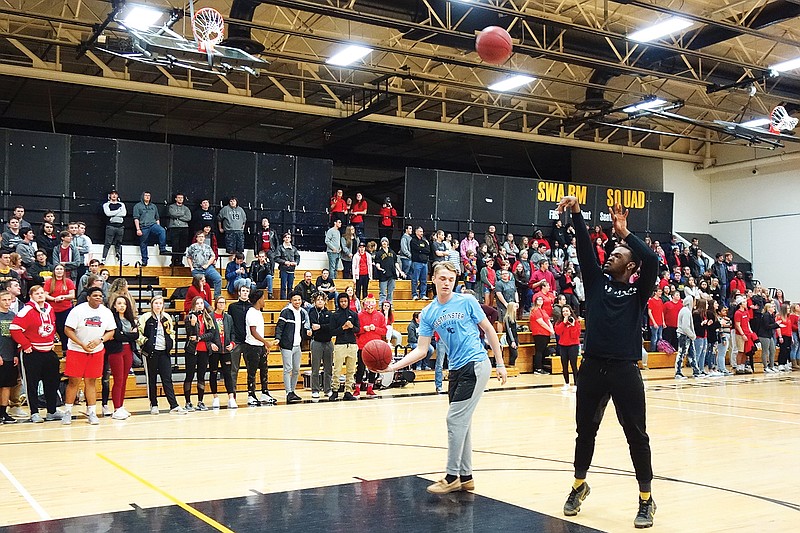Money raised by Callaway County students could be helping to fund COVID-19 research.
Kim Robertson, director of the Central Missouri branch of the American Heart Association, said AHA has directed $2.5 million toward researching the disease. Robertson spoke Wednesday during the virtual Fulton Rotary Club meeting.
"We were able to quickly free up some funds get some money to people trying to find a cure for COVID," she said.
Robertson said the research is vital and overlaps AHA's heart-health mission. The national nonprofit funds cardiovascular medical research and promotes heart health and disease awareness.
"Many people who end up having severely negative effects from COVID-19, where they're hospitalized or they die, they have some sort of disease of the heart," she said. "We don't know yet if that's because of COVID-19 or if they had some prior issue. There's still a lot of research being done about that."
People who already have a cardiovascular disease are at high risk for complications, according to the AHA. However, the virus can also cause cardiovascular complications, early research indicates.
"We're seeing a lot of people who have recovered, who are younger, meaning under 40, who're having some sort of stroke-type complications," Robertson said. "We're trying to figure out if COVID is the cause of that or anomaly."
Blood clots and myocarditis (inflammation of the heart muscle) are other potential complications. For more information, read this Fulton Sun article: bit.ly/2LQ54oX.
It's possible money raised locally could be part of that $2.5 million. Each year, Callaway County elementary students participate in "Jump Rope for Heart," an AHA fundraiser also designed to get children thinking about cardiovascular health. The students seek sponsors and complete heart-pumping activities.
"A lot of kids in our country have never been introduced to fundraising and philanthropy until they reach elementary school and learn about Jump Rope for Heart," Robertson said.
Additionally, student "heart warriors" at Fulton High School organize an annual heart health awareness week and fundraiser.
While it's impossible to say whether money from local events such are among the funds being poured into COVID-19 research, local children have certainly helped fund other research, Robertson said.
"We like to be very transparent with how we spend the money people give us," she said. "Every dollar that comes in is greatly appreciated."
Of funds received by AHA each year, 35 percent goes toward public health education and 21 percent toward research.
"Research is a big part of what we do," Robertson said. "We're funding seven projects at the University of Missouri right now."
New initiatives
Robertson also updated the Rotary Club on other recent AHA projects.
"We've been advocating high school seniors to be trained in hands-only CPR - 38 states have passed legislation," she said. "Now, as a requirement to graduate high school in Missouri, every senior has to be trained in hands-only CPR."
Current research suggests hands-only CPR - that is, CPR that doesn't involve giving rescue breaths - is an effective life-saving measure for adults and teenagers. It's also an easier technique to learn and remember. It's also, incidentally, easier to perform while wearing personal protective equipment such as a mask, Robertson added.
"Now we know a normal adult has enough oxygenated blood in the body that if you just keep heart pumping, you can keep them going," Robertson said. "Something I always tell people is statistics show that 80 percent of the time when you're giving hands-only CPR, you're giving it to someone who lives under your own roof - so think about not performing it on a stranger in the middle of the street but on someone you love."
AHA is also pushing for research into preventing vaping among teens.
"We were very successful getting use of traditional smoking down, then out of the blue vaping hit us pretty hard," she said. "It's addicting a whole new generation to tobacco. We've started recently to tackle the huge problem that is vaping in our communities."
Though the need for AHA's research and education are still high, donations are down.
"A lot of our fundraising activities happen in the spring, so AHA has taken huge hits in fundraising," Robertson said.
To support the American Heart Association's initiatives via a donation or learn more, visit heart.org.

